#45 PROJECTIVE VERSE, DHARMA POETICS, AND A POETICS OF MIND AT PLAY IN SPACE (Part One)
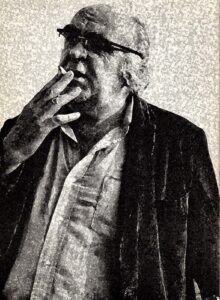
Charles Olson, in the Projected Field
“Let me put it baldly. The two halves are:
the HEAD, by way of the EAR, to the SYLLABLE
the HEART, by way of the BREATH, to the LINE”
–Charles Olson,
“Projective Verse”
It seems extravagant, suddenly, or maybe merely perverse, to concern oneself with the philosophy behind how to write poetry, i.e., a poetics, with the nation balanced on a razor blade, and really, it seems, quite determined to cut itself in half. Not only this, but I feel compelled to return to a few pages Charles Olson put out nearly 75 years ago. Whatever might pass for a poetics of currency, I have to admit I know nothing about it. The last I remember decades back concerned the post-modernist, “LANGUAGE” poets, but I never thought them especially compelling. However, going back to Olson (1910-1970) I found that I quite understood where he was coming from, and as a Jack Kerouac School student, I suppose it’s bred in the bone.
I feel the weight of an apologia for poetry. To view it in the high, Parnassian light wouldn’t make the slightest sense to the average person who can’t make heads or tails out of relatively simple lines. Almost anything will flummox them. How about these, by Michael McClure:
Our view of Life is still so young and so worn
and ripped by the brutal tatters we made of it!
I can see the freshman English class staring at me blankly. If I ask them what they think those lines address, they continue to stare in deepening silence. As we merge farther and farther into the post-literate McLuhan age, where if a TikTok video lasts for a whole sixty seconds, the viewer gets antsy, what relevance can poetry truly have, much less the high crest or the abysmal plunge necessitated by a vital human effort to find words giving birth to greater vision, one neither so immature nor worn out that it can’t move us at the most fundamental level?
But that, I think, constitutes the poetics Olson was after.
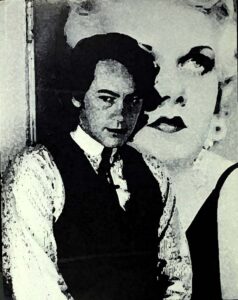
Michael McClure, young but not worn
Someone–who’d recently sold her house in Boulder, and late in life, had decided to divest from her library–gave me a few of her books. One I took, Scratching the Beat Surface, you found everywhere at Naropa in 1982, the year it came out, but I’d never read it. It contains Michael McClure’s (1932-2020) own poetics, at least the thrust of it, with lots of open-ends pointing this way and that, enacting his poetics as his poetry would, feeling into one’s body as the body of the world (are they different?), an open-ended investigation.
This sent me back to Donald Allen’s watershed anthology, The New American Poetry, where it became plain that he’d collected everyone relevant to the post-war avant-garde and a clear lineage or mandala to the Naropa Poetics program, at least as of 1960. Here Olson (as well as the other 43 poets) seeks to break out of the traditional metric patterning, rhyme scheme, and formal structure of “closed verse,” passionately looking for what he calls elsewhere the “primitive-abstract,” though what I think he means is “primal.” It comes before you’ve burdened the process of putting your immediate perception into words with scholasticism, well-worn poetic moves, or other kinds of lazy habits. As I read it, he advocates for the poet riding his or her (or LGBTQetc.) chi wherever it takes you, preferably into the wilds beyond your usual ego boundaries.
Olson quotes Edward Dahlberg’s maxim: “ONE PERCEPTION MUST IMMEDIATELY AND DIRECTLY LEAD TO A FURTHER PERCEPTION.” Allen Ginsberg (1926-1997) liked to repeat this one. I take this to mean a mindfulness of consciousness as it moves quickly, like neurons firing through shifting matrices. Rather than forcing it into standardized composition, familiar emotive expressions, cliché conclusions, etc., you allow it to be its own possibly contradictory self (I AM LARGE! I CONTAIN MULTITUDES!), in a continuous act of forming and disintegrating worlds.
This would dovetail with or at least intersect Chogyam Trungpa’s (1939-1987) “first thought, best thought” instruction on how to make art. “First” means not from habitual patterns but before you think, in the sudden insight of the moment, the spontaneous gesture, the unexpected image or inspired turn. The line comes from space—form arisen vitally from openness or Heaven birthing Earth–which finds expression through the poet, attuned to direct experience, and thus coming to embody the brilliance of the moment in a naked language where it finds life. In classical Buddhist terms, you’ve synchronized with innate reality, you’ve embodied it fully enough such that it’s termed the buddha kayas, or “bodies of buddha,” known in Chinese as the joining together of Heaven and Earth in the expressive connecting point of the Human, through whom comes artfulness. (More on this topic in previous blog postings.)
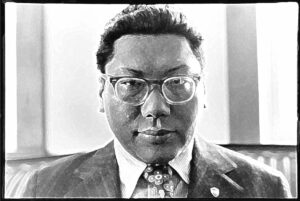
The primal Chogyam Trungpa
This contrasts with what Olson calls, based on the “Objectivist” poets, “subjectivism.” This is where egocentric mind falls easily into its habitual “I” tracks (“It has excellently done itself to death,” Olson comments). Both potentials exist in any poet, but since our culture has trouble teaching us to think beyond our personal considerations, the poetic reflex becomes a rehash of the familiar, surface ego-identity, as if all we have to say inevitably begins with “I.” At a post-grad class at Naropa with Keith Abbott, he’d assigned a story by William Carlos Williams about a racist doctor told in first person. I still remember the astounded look on his face when the class could not separate a fictional character from the narrator and assumed Williams to be no different than the “I” of the story, and thus they condemned, as they saw it, Williams’ racism. They could not imagine, apparently, writing about an “I” who wasn’t themselves.
That is the hard crust of noise, distraction, and static we must operate within, and any poetics meaningful enough to practice has to arise from a more essential level of being, a more vibrant level of perception, or maybe we really do deserve to be ignored by the masses. Allen Ginsberg, who most certainly, following Whitman but also Jack Kerouac, centered his writing in the autobiographical daily life of his personal consciousness, and again, following Whitman, saw that as informing on the world around him; that to witness and notate direct perception meant also a world of people and objects in an unfolding scroll of detail, such that if you read him 500 years from now, you’ll know a lot about a lived human life, the planet his eye saw alive at that moment.
I suppose he doesn’t get noticed as an “Objectivist,” or as Olson calls it, “objectism,” but his matured poetics by the time he reached the mid-1960s, had settled into a very noun/adjective heavy line, and he eventually merged this with a Buddhist meditative sensibility of reporting on the now. Here’s some lines from a poem written in the 80s, “One Morning I Took a Walk in China”:
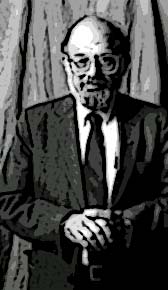
Allen Ginsberg, notating the world
Leeks in a pile, bright orange carrots thick & rare, green unripe tomatoes,
parsley, thin celery stalks awful cheap, potatoes & fish—
little & big heads chopped or alive in a tub, tiny fresh babies or aged carp
in baskets—
a half pig on a slab, two trotters stick out, a white burlap shroud covered
his body cleaved in half—
meat of an ox going thru a grinder, white fat red muscle & sinew
together squeezed into human spaghetti—
It’s a poetics of the natural world—“natural” in the scientific sense, meaning the “material world” in all its aspects–and a continuous interest in its materiality as poetic statement. The “me” becomes known through what it perceives, through the world it moves through.
But I think Olson would not have been quite so focused this way. He saw the open space of the page as a territory to exhale into and adventure in. He dwells on the meaningful contribution of the typewriter, allowing the writing to become a notation on the level of sheet music—that you could use the spaces to determine sound and rhythm, now that you could write by hand what you couldn’t previously experience before the poems got typeset (I bet he would’ve liked word processing).
And this very much affected my own practice, as I’ve frequently tried to write my poems all over the page, and with only rare enjambment, I’ve used the ends of or gaps in lines as pauses, with the total space of the page as a field where the mind sees and expresses itself, and finds what it has to express, both as sound and visual landscape. Here I owe a great debt to Philip Whalen (1923-2002), who clearly regarded that empty space as his playground (he would’ve liked word processing too).
Which brings me to a place of both personal and philosophical quandary.
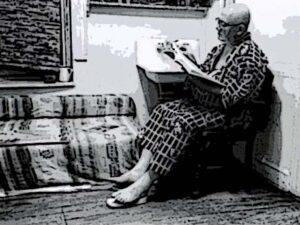
Philip Whalen, at play in space
Olson reconstructed poetic practice as twofold. First, from head to ear to syllable. “Head,” I take it, means intellect, which he connects to being able to listen finely to the words at the syllabic level, a way to ride the sounds and govern the meanings. Second, he connects heart to its expression in breath, emerging as the line, the fundament of the poem, just as Ted Berrigan thought about it. “Heart” has to be the felt dimension; while “breath” here replaces “closed verse” and its metrics, etc. He’s tied the line to the speaking voice vs. inherited, fixed musical patterns.
And I think, though I haven’t fully studied my own process, I broadly fall into this way of working. Olson’s bifurcation of head and heart reflects the western tradition, whereas in Asia both “head” (/intellect) and heart reside in the same place. How sensitive am I to syllables? I have to wonder. (Not like Creeley, for instance.) Yet, they’re the irreducible fine grain of the poet’s ear. Inasmuch as a poet’s language has legs, it’s an exuberance or even a purgatorial transformation that brings the vitality and lives in the wording. And can that wording speak in a way to envision and dance in its own mandala, expressive and sublime enough to go beyond whether you understand it or not?
That’s “seriousness” in poetics, in the poet’s life of exploration. Here I simply have no idea if I’m “serious” or not. Was Philip Whalen? He certainly committed himself to what you have to think, reading him, was joyful, inspired, humorous brattiness, and a willing to play in space as his own dragon, dancing the elements into flurries of luminous daily objects and ever reliable wit. He abides in his mandala, its idiosyncratic voice.
Maybe that’s what my seriousness aspires: to be a spirit at play in the page.
This week I’ll attend Naropa University’s 50th Alumni weekend, and read with poets who’ve come down this lineage and whatever subsequent influences that later grew strong at the Jack Kerouac School of Disembodied Poetics. When I think back on my two degree programs, I think, on balance, I had a blast–a special time where I got to emerge from small Vermont town narrowness into a much bigger vision of the world. I’m delighted to say that it shaped me, my aesthetic expression, and helped me re-see my daily life, all qualities I carry to this day. It maybe takes some kind seriousness to trust that you can play spontaneously in space.

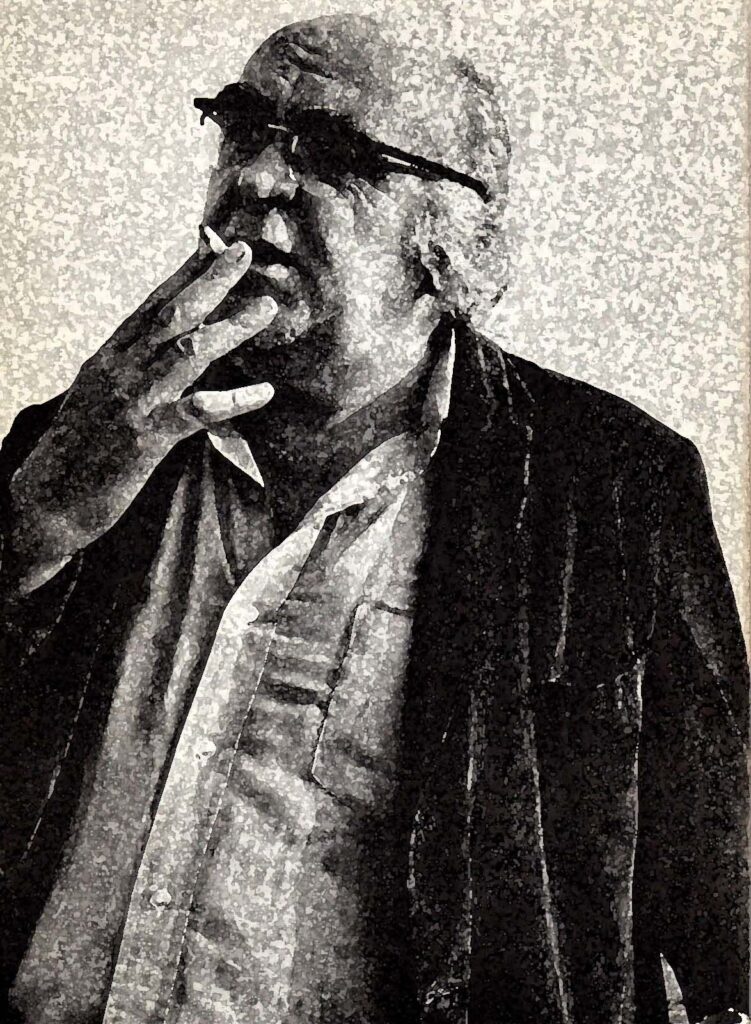
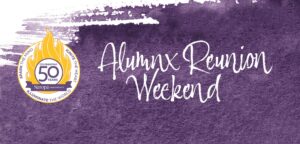
Nice statement Gary. The thing about the “I” and inability of students to see the difference between Williams and the narrator– is this a matter of readers unaccustomed to fiction in general– Jane Eyre not being Charlotte Bronte– would they know that? And today’s writing– poetry, the fiction that is reviewed in the New Yorker– so much has the first novel auto-biographical feel– is Kerouac and his generation, or ours, responsible for that, at least in part?
As for syllables, I used to hear Creeley so much in my ear that I started to imitate his delivery, and that had to stop. But I don’t want to escape from rhythm– and a rolling line I found developing after reading the complete Shakespeare– the theatricality of it, seemed to fit the oral nature of the poetry reading and allowed me to expand from my short, snarky poems of the 80s into something more mature (sort of mature.)
Shakespeare wrote for theater so he had to be large– a very gregarious theater with illiterate people in the same place as the educated elite and the in-betweens– and naturally being a commercial entertainment, there was money in it, but that commerce wasn’t today’s commerce, actors and writers didn’t make much money although they got to rub shoulders with it. So while a market made it possible for Shakespeare to write, he had to work his ass off and rub shoulders at the same time and invest in The Globe and gain favor but when it came down to it, he was simply a great writer who told great stories. He was ambitious and had a family to feed even though he probably didn’t see them much. His writing may have been driven by demand, but the talent went beyond meeting the demand of his audience. He had the right spirit.
i think I remember Anselm saying something like that, that all poetry should be written in English, and it seemed smart but a shade jingoistic, until I considered that he’d translated so much and probably wrote a bit as a youngster in Finnish Swedish or German– languages he heard at home– but English was his favorite because– of whatever it has, its relative grammatical & syntactical simplicity which suited his own work.
As for Kerouac’s exuberance– mostly the people who inhabit the open mikes and tiktoks are very simplistic and what’s the word, solipsistic, they don’t see far beyond themselves and their complaints, and then there are those who just lecture the audience with their opinions and wisdoms. So even those who go to creative writing classes are stuck in that mirror phase, and they want to “perform” their poetry for an audience, but they don’t write outside of themselves because they don’t read much at all, and some of them arrive late and leave early to boot. So they don’t listen to anyone else. They don’t have the exuberance of language that Jack had with his erudition in two languages and they don’t have the curiosity to seek out anything they don’t encounter on the internet. They are not driven. You know the old saying, to hide something from him, put it inside a book? It might be aimed at 90% of the people who call themselves poets now. “Reading is boring.”
I’m sure Shakespeare did do it for money. But then you can find people like, say, Shelley or Byron, who genuinely didn’t need the money. I wonder if the “popular” aspect of what he had to do in his writing didn’t in some cases create some balance for him–like Hamlet thinks all these incredibly subtle things, but you still get some action scenes, humor, etc., so the whole thing never becomes merely cerebral.
I know what you’re saying about the open mike people (I’ve never looked at TikTok–it doesn’t sound interesting). It’s not just a reflection of poets being too self-absorbed; I think it’s a reflection of the culture being too self-absorbed. You wonder how crowds nowadays at those readings would react if Kerouac (under a pseudonym) got up there and read–not even Mexico City Blues but something relatively easy like On the Road. Would they get off on it? I think it’s possible. It might affect them, or at least some of them, to rethink what they do. Myself, I was always drawn to writers who were adventurous. I read Gravity’s Rainbow in 10th grade (it took me two months). I don’t think I was the same after that experience.
I wonder if creative writing programs actually make an effort to get you beyond your ego. To some extent, maybe, but they don’t land on it cleanly as a problem. How do you get into the mind at large? It’s not so easy, and it does help to have inspiration, like Naropa provided…or Gravity’s Rainbow.